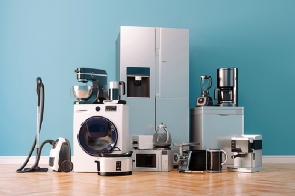Second-Hand Fridge Sellers Association in the Ashanti region is threatening to stage a demonstration against the government over a ban on the importation and sale of second-hand refrigerating appliances.
Members of the association said the decision taken by the government will render more than 1,000 people jobless in the region alone if it does not rescind the decision.
The Energy Commission recently announced a ban on the importation and sale of about 20 electrical appliances including refrigerating appliances, air conditioners, and electric kettles among others.
A statement signed by the Energy Minister, Matthew Opoku Prempeh said the decision was to prevent Ghana from becoming a destination for substandard and used appliances to save the economy by reducing energy demand.
The Regional Chairman of the Second-Hand Fridge Sellers Association, Mr Kwadwo Antwi told Class News' Elisha Adarkwah that the energy-saving claim by the Minister is inaccurate because most second-hand appliances save energy more than new ones.
Most buyers, he said, prefer the second-hand fridges to the new ones since some of the second-hand fridges are quality than the new fridges aside from being energy efficient.
Mr Antwi suggested that the government, instead of completely banning the importation, should rather set a standard for second-hand refrigerating appliances which should be imported into the country.
He, therefore, called on the government to heed their plea and rescind the decision else they will hit the street to demonstrate against it.
His call dovetails into similar demands by the Minority in parliament.
According to the Minority, the policy if not reviewed, will not only render a vast majority of those who trade in these appliances unemployed but would equally have severe economic consequences on the already impoverished Ghanaian consumer, since many depend largely on these appliances.
A statement signed by John Abdulai Jinapor, MP-Yapei/Kusawgu Constituency and Ranking Member, Mines, and Energy Committee, said the way and manner in which the Legislative Instrument (LI) was rushed through Parliament without adequate consultation and extensive engagement with the various stakeholders was most unfortunate and appalling.
“It is important to remind the Energy Commission that best practices will require the Commission to engage in extensive consultations, particularly with the Mines and Energy Committee of Parliament, to solicit their views and input on such an important LI before implementation.
“Even more disturbing is the lack of a grace period or transition period before implementing this policy. For such a policy that has far-reaching consequences, it is only proper that some transition period is allowed to enable traders and consumers ample time to adjust to the policy, especially this time that the uncertainties in the Ghanaian economy are abound,” the statement said.
It noted that some of these used electrical appliances can be more energy efficient and durable than new ones depending on the make, brand, and standards.
This policy, the statement said clearly contradicts the Government's position that the country has so much excess capacity.
“For the records, it must be noted that the current electricity tariff structure is graduated in bands with higher payments for higher electricity consumption which serves as a gentle caution for consumers to acquire energy-efficient appliances whether new or used ones.
“By this policy, even a returnee Ghanaian is not allowed to come along with his or her 3-month-old electrical appliance, which, by all intends and purposes, could still be as good and useful as a new one. This current policy is not only unfair but discriminatory,” it added.
The solution to achieving energy efficiency and preventing ‘DUMPING’ according to the Minority is to resort to the use of standards and effective regulatory measures rather than “this very harsh policy of banning all used electrical appliances.”
“So, the government must be ready to engage, learn from best practices, and adopt sustainable regulatory measures to achieve results other than reacting inappropriately to situations such as this.”
The Minority, therefore, called on the Energy Commission and for that matter the government, to as a matter of urgency, withdraw this current policy and allow for further consultation, engagement with the relevant stakeholders and a possible review and adjustments before the implementation of the policy.
Business News of Thursday, 2 February 2023
Source: classfmonline.com

















